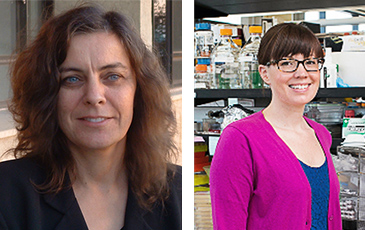
Thirteen UC Berkeley faculty, seven of them women, are among 47 new investigators chosen by the Chan Zuckerberg Biohub to receive up to $1.5 million each over the next five years to conduct cutting-edge biomedical research — with no strings attached.
CNR faculty members Jill Banfield and Kimberley Seed are among the group.
The investigator awards are the first individual grants by the CZ Biohub as it seeks to foster unconventional scientific exploration and encourage researchers to invent new tools to accelerate the pace of discovery.
The CZ Biohub was established in September 2016 with $600 million over 10 years from Facebook founder and CEO Mark Zuckerberg and his wife, pediatrician Priscilla Chan, and operates as an independent nonprofit medical research organization collaborating with UC Berkeley, Stanford University and UC San Francisco to fund research. Its goal is to harness science, technology and human capacity to cure, prevent or manage all disease during our children’s lifetime.
“CZ Biohub investigators share our vision of a planet without disease,” said Joseph DeRisi, co-president of CZ Biohub and a professor of biochemistry and biophysics at UCSF. “To realize this vision, we are giving some of the world’s most creative and brilliant researchers access to groundbreaking technology and the freedom to pursue high-risk research. CZ Biohub investigators will challenge traditional thinking in pursuit of radical discoveries that will make even the most stubborn and deadly diseases treatable.”
Jill Banfield, a professor of earth and planetary science and of environmental science, policy and management, explores the medical, industrial and ecological significance of newly found microorganisms. Her previous work has uncovered a vast diversity of microorganisms that depend on coexisting microbial community members for most core metabolic resources, revealing two major evolutionary radiations, one in bacteria and the other in Archaea.
Kimberley Seed, an assistant professor of plant and microbial biology, carries out epidemiologic studies of the interactions between bacteriophages and Vibrio cholera, some strains of which cause cholera, in samples obtained from cholera outbreaks to enhance understanding of how these viruses shape the communities of these pathogens and affect infectivity. She will also determine how microclimates impact phage-host interactions.
Six of UC Berkeley’s new investigators, including Banfield, are senior faculty. Each will receive $1.5 million over five years to pursue their research, with the freedom to change direction if they desire — an option not allowed by most research grants.
The seven other investigators, including Seed, are younger faculty, and will receive half the amount, $750,000 over five years, with a similar flexibility.
“The CZ Biohub has chosen some of Berkeley’s best and most innovative researchers, who offer an amazing breadth of expertise,” said UC Berkeley Chancellor Nicholas Dirks. “This first cohort of investigators illustrates the potential and promise of the CZ Biohub to push the boundaries of biomedical research, and to accelerate the development of breakthrough scientific and medical advancements, applications and therapeutics for the public’s benefit.”
The 47 investigator awards, totaling $54 million over five years, also go to 15 faculty at UCSF and 19 at Stanford. They will complement the CZ Biohub’s large-scale collaborative projects, including the Infectious Disease Initiative and the Cell Atlas.
“The 47 CZ Biohub investigators we’re introducing today are quite literally inventing the future of life science research,” said Stephen Quake, co-president of CZ Biohub and a professor of bioengineering and applied physics at Stanford. “The CZ Biohub is distinguished by our emphasis on technology and engineering, and our researchers are inventing tools to accelerate science for the good of humanity.”
For more information and a list of all UC Berkeley investigators, visit the UC Berkeley News Center.
